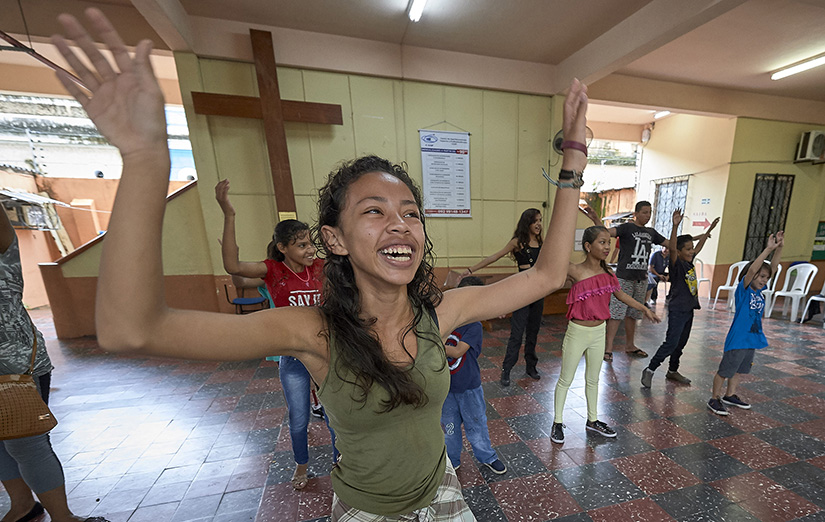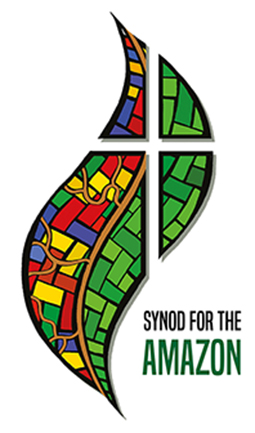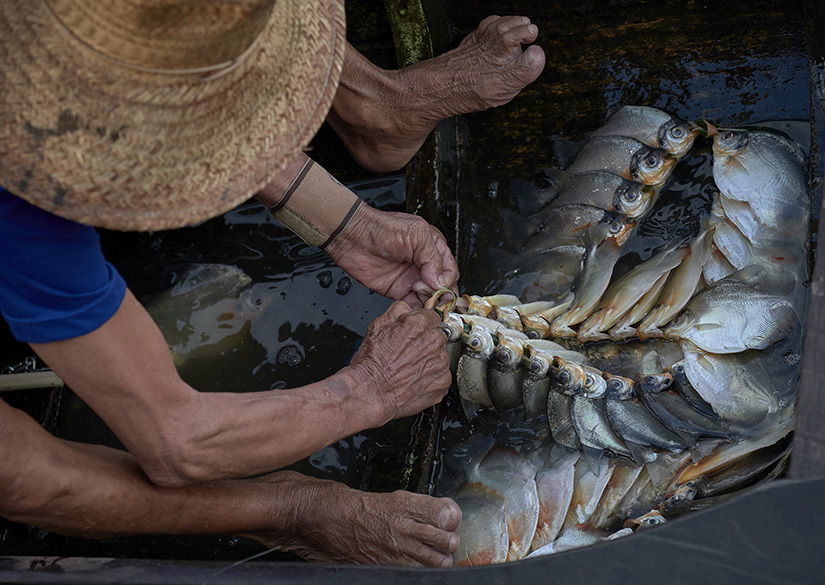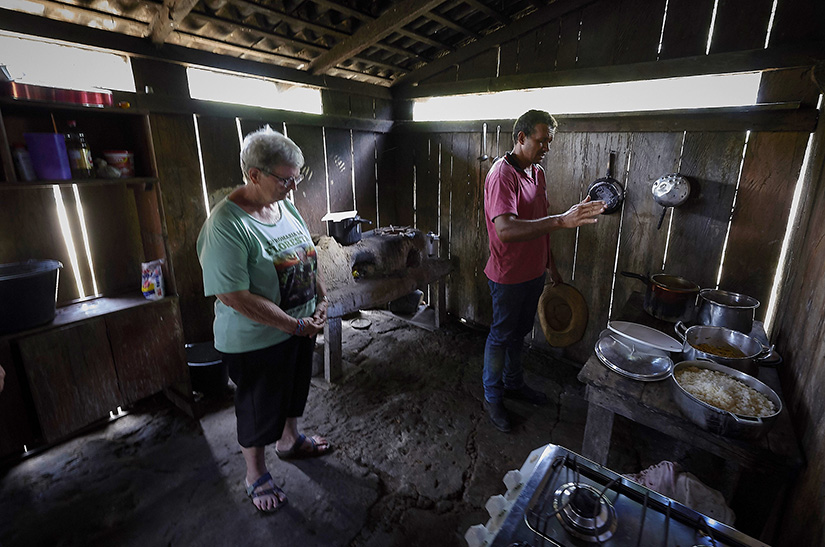LIMA, Peru — When Pope Francis came face to face with more
than 2,000 Amazonian indigenous people in Peru in January 2018, he told
them the place where they live is holy ground, and that they and the
Amazon region are important to the Catholic Church and the entire world.
 A girl danced with other children as they participated in a group activity in the office of Caritas in Manaus, Brazil. The weekly gathering, sponsored by the Catholic Church’s social ministry, is part of an educational and cultural program to combat sexual abuse and exploitation among at-risk children.Photo Credits: Paul Jeffrey | Catholic News ServiceFor
most of October, more than 100 bishops will meet at the Vatican to
wrestle with what that means for the Church’s ministry in a politically,
culturally and ecologically complex region where indigenous people face
increasing threats.
A girl danced with other children as they participated in a group activity in the office of Caritas in Manaus, Brazil. The weekly gathering, sponsored by the Catholic Church’s social ministry, is part of an educational and cultural program to combat sexual abuse and exploitation among at-risk children.Photo Credits: Paul Jeffrey | Catholic News ServiceFor
most of October, more than 100 bishops will meet at the Vatican to
wrestle with what that means for the Church’s ministry in a politically,
culturally and ecologically complex region where indigenous people face
increasing threats.
The task for the bishops at the Synod of
Bishops for the Amazon is to lay out, as the synod’s title puts it, “new
paths for the Church and for an integral ecology.” The decisions they
make will reverberate not only in the Amazon region, but elsewhere in
the world.
Pope Francis is calling for a Church with “an Amazonian
face — the face of the indigenous person, the river dweller, the black
person, the person of mixed race,” said retired Bishop Erwin Krautler of
Altamira, Brazil.
The diversity of faces reflects the complexity of issues in the region.
The
Amazon region covers an area roughly the size of the continguous United
States. Although most of it is in Brazil, eight other countries share
parts of the region. The national boundaries, which are generally
heavily forested and far from capital cities, often are lawless areas
where drug traffickers, human traffickers, illegal loggers and illegal
miners operate with impunity.
Even away from borders, areas
inhabited by indigenous people are coveted by miners, loggers and
ranchers eager to expand into the Amazon region. Community leaders who
speak out and defend their territories risk harassment, death threats
and assassination.
At least 300 indigenous groups live in the
region. A single parish may include scores of widely scattered villages
accessible only by boat, and it could take several weeks to reach the
most distant community. The difficulty and expense of travel, and the
relatively small number of priests and sisters, makes it virtually
impossible to visit communities frequently.
Unless they live in
cities or in towns where a parish team lives, Catholics in Amazonia have
little access to the sacraments. In some places, a priest visits only
once a year, celebrating the Eucharist, marriages and baptisms. Some
communities rarely see a priest.
That is likely to be a key point
on the synod agenda. The working document contains a proposal for a type
of ordination for village elders who are in stable relationships. They
would not have all the faculties of priests, but they would be able to
preside over eucharistic celebrations.
When the synod document was
released, that proposal grabbed headlines worldwide, as some observers
saw it as a first step toward allowing married priests. But the pope has
said that is not on the table, and the document explains that the
functions of the ministers would be limited to celebrating the Eucharist
for Amazonian Catholics.
The bishops also are likely to explore
new roles for women in the Church in the Amazon region. The document
calls for them to “identify the type of official ministry that can be
conferred on women, taking into account the central role that they
currently plan in the Amazonian Church.”
 A fisherman strung his catch in Santarem, a city along the Amazon River in Brazil’s northern Para state. The Synod of Bishops on the Amazon seeks to lay out “new paths for the Church and for an integral ecology.”Photo Credits: Paul Jeffrey | Catholic News ServicePope Francis announced
the synod in 2017 and launched it with an initial meeting in January
2018, during his visit to the town of Puerto Maldonado, in the Peruvian
Amazon. More than 40 assemblies were then held in Church jurisdictions
throughout the Amazon, so Catholics in the nine countries could discuss
the issues that most affect them.
A fisherman strung his catch in Santarem, a city along the Amazon River in Brazil’s northern Para state. The Synod of Bishops on the Amazon seeks to lay out “new paths for the Church and for an integral ecology.”Photo Credits: Paul Jeffrey | Catholic News ServicePope Francis announced
the synod in 2017 and launched it with an initial meeting in January
2018, during his visit to the town of Puerto Maldonado, in the Peruvian
Amazon. More than 40 assemblies were then held in Church jurisdictions
throughout the Amazon, so Catholics in the nine countries could discuss
the issues that most affect them.
Those topics — ranging from
threats from oil production and mining to alcohol and drug addiction and
domestic violence — were included in the synod working document and are
likely to be discussed when the bishops meet.
The document
highlights the importance of the Amazon basin as an ecosystem that
provides 15 percent of the fresh water on the planet and helps regulate
the global climate. By holding the synod in Rome, Pope Francis is
stressing the importance of the Amazon for the world, as he did in the
encyclical “Laudato Si’, on Care for Our Common Home,” published in
2015.
As one of the most biologically diverse areas of the earth,
the Amazon region has given rise to great cultural diversity. About 3
million of its 31 million inhabitants are indigenous.
Throughout
Latin America, indigenous people generally are among the poorest. The
lack of jobs and decent schools in their villages spurs steady migration
from rural areas to cities, where indigenous people face discrimination
and struggle to maintain their traditions.
At the synod, the
bishops are also likely to consider new forms of urban ministry,
especially ministry among indigenous people who have settled in cities.
Another
group of Amazonian people who suffer prejudice are those of African
descent. In Brazil, before slavery was abolished in 1888, some slaves
escaped and fled into the forest, forming communities called quilombos.
Their territorial rights are even more precarious than those of
indigenous people, because the quilombos lack official recognition as
traditional communities.
Pope Francis is not the first pontiff to
focus the Church’s attention on the Amazon. In an encyclical to the
bishops of Latin America in June 1912, Pope Pius X decried the slavery
and brutality that accompanied the rubber trade, in which tens of
thousands of indigenous Amazonians died.
Bishops from Church
jurisdictions in the Brazilian Amazon have gathered periodically since
1954, Bishop Krautler said. When they met in 1972 in the Amazonian city
of Santarem, Pope Paul VI sent a message of support.
When the
bishops from Latin America and the Caribbean met in the Brazilian city
of Aparecida in 2007, they discussed environmental issues, and a section
on the Amazon was included in the final document of that assembly.
The
synod will continue that trend, this time highlighting the importance
of the Amazon region for the universal Church, Bishop Krautler said.
“It
will be a great event of dialogue, of discussion, of proposals,” he
said. “We do not hope for pious counsel from the synod. We hope that the
synod will be a source of renewed impetus for the Church throughout the
world.” Edimilson Ferreira Nascimento, 37, leader of the God and Life Association, an organization of small farmers, prayed over the food being prepared in his rural home near Anapu, in Brazil’s northern Para State. Beside him is Sister Jane Dwyer, a Sister of Notre Dame de Namur from the United States. The area has seen violent conflict between small farmers, who are backed by local Church activists, and large ranchers and loggers.Photo Credits: Paul Jeffrey | Catholic News Service
Edimilson Ferreira Nascimento, 37, leader of the God and Life Association, an organization of small farmers, prayed over the food being prepared in his rural home near Anapu, in Brazil’s northern Para State. Beside him is Sister Jane Dwyer, a Sister of Notre Dame de Namur from the United States. The area has seen violent conflict between small farmers, who are backed by local Church activists, and large ranchers and loggers.Photo Credits: Paul Jeffrey | Catholic News Service
Synod will focus on evangelization, pope explains
By Carol Glatz | Catholic News Service
VATICAN CITY — The upcoming Synod of Bishops on the Amazon is
an “urgent” gathering, not of scientists and politicians, but for the
Church whose main focus in discussions will be evangelization, Pope
Francis said in a new interview.
However, the importance of the
Amazon region’s biodiversity and current threats it faces also will be
addressed because “together with the oceans, (the Amazon) contributes
decisively to the survival of the planet. Much of the oxygen we breathe
comes from there. That’s why deforestation means killing humanity,” he
said.
The pope also talked about the dangers of surging
nationalism and isolationist sentiments, saying, “I am worried because
you hear speeches that resemble those by Hitler in 1934. ‘Us first, We…
We ….’”
Such thinking, he said, “is frightening.”
The pope’s
comments came in an interview posted Aug. 9 by “Vatican Insider,” the
online news supplement to the Italian newspaper La Stampa.
Asked about the dangers of “sovereignism” or nationalism, the pope said it represented an attitude of “isolation” and closure.
“A country must be sovereign, but not closed” inside itself, he said.
National
sovereignty, he said, “must be defended, but relations with other
countries, with the European community, must also be protected and
promoted.”
“Sovereignism,” on the other hand, he continued, is something that goes “too far” and “always ends badly — it leads to war.”
When
asked about populism, the pope said it was one thing for people to be
able to express their concerns, but quite another “to impose a populist
attitude on the people.”
“The people are sovereign,” with their
own way of thinking, feeling, judging and expressing themselves, he
said, “while populism leads to forms of sovereignism. That suffix,
‘—ism,’ is never good.”
Asked about “the right path to take when
it comes to migrants,” the pope said, “First and foremost, never neglect
the most important right of all: the right to life.”
“Immigrants come above all to escape from war or hunger, from the Middle East and Africa,” he said.
When
it comes to war, “we must make an effort and fight for peace” as well
as invest in Africa in ways that help the people there “resolve their
problems and thus stop the migration flows.”
Concerning immigrants already in one’s home country, certain “criteria must be followed,” he said.
“First,
to receive, which is also a Christian, Gospel duty. Doors should be
opened, not closed. Second, to accompany. Third, to promote. Fourth, to
integrate” the newcomers in the host communities, he said.
“At the
same time, governments must think and act prudently, which is a virtue
of government. Those in charge are called to think about how many
migrants can be taken in.”
If that threshold is reached, “the
situation can be resolved through dialogue with other countries” because
some countries need people, especially for working in agriculture or
for reviving their economy and breathing new life into “half-empty
towns” because of low birthrates, he said.
When asked why he
convened a synod on the Amazon, Pope Francis said, “It is the ‘child’ of
‘Laudato Si’.’ Those who have not read it will never understand the
Synod on the Amazon. ‘Laudato si” is not a green encyclical, it is a
social encyclical, which is based on a ‘green’ reality, the safeguarding
of creation.”
Among the environmental issues the pope is
concerned about, the one that “has shocked me the most,” he said, is the
way resources are increasingly being consumed faster than they can be
regenerated.
“It’s very serious. It’s a global emergency,” he
said, highlighting that “Earth Overshoot Day” fell this year on July 29 —
the day when resource consumption goes into “debt” because the annual
demand on nature exceeds what the earth can regenerate in that year.
The
seriousness of the problem means “ours will be an urgent synod. But
beware: a synod is not a meeting of scientists or politicians. It is not
a parliament; it is something else,” he said.
The synod “is born”
from the Church “and will have an evangelizing mission and dimension.
It will be a work of communion guided by the Holy Spirit,” the pope
said.
Pope Francis was asked whether the possibility of ordaining
older, married men to minister in remote areas would be one of the main
topics of discussion. The pope replied, “Absolutely not. It is simply
one number” in the working document.
The 45-page working document, which serves as a guide for discussions, contains 146 numbered items, outlining various topics.
One
sub-item in a list of suggestions for ways to create appropriate and
needed ministries said, “Affirming that celibacy is a gift for the
Church, it is requested that, for the most remote areas of the region,
the possibility of priestly ordination be studied for older people,
preferably indigenous, respected and accepted by their community, even
if they have an existing and stable family, in order to ensure
availability of the Sacraments that accompany and sustain the Christian
life.”
When it comes to the main purpose and aim of the synod,
Pope Francis said, “the important thing will be the ministries of
evangelization and the different ways of evangelizing.”
In a
question regarding ecological concerns and what stands in the way of
safeguarding the Amazon, the pope said, “The threat to the lives of the
people and the land derives from the economic and political interests of
society’s dominant sectors.”
When asked what policymakers should do, the pope said they should rid themselves of all complicit and corrupt practices.
“They
must take concrete responsibility, for example on the issue of
open-cast mines, which are poisoning water and causing so many diseases.
Then there is the issue of fertilizers,” he added.
When asked
what he feared most concerning the planet, he said, “The disappearance
of biodiversity, new deadly diseases” and the kind of loss and
“devastation of nature that can lead to the death of humanity.”
He
praised the increased awareness and movements among young people, such
as Greta Thunberg, the Swedish teenager whose #FridaysForFuture campaign
asks students to hold a strike to demand swift action on climate
change. Pope Francis had met the 16-year-old environmental activist at a
weekly general audience in St. Peter’s Square in April.
The pope
said the big and small things people can do each day “does have an
impact” because change relies on real, concrete action. Also, people
engaging in more environmentally responsible behavior “creates and
spreads the culture of not polluting creation.”